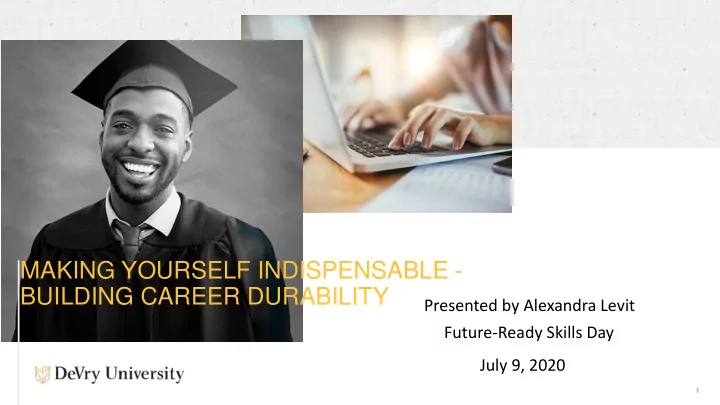

MAKING YOURSELF INDISPENSABLE - BUILDING CAREER DURABILITY Presented by Alexandra Levit Future-Ready Skills Day July 9, 2020 1
• 1 in 4 respondents said they were thinking of changing careers due to TODAY’S LANDSCAPE COVID-19 • Of those employed, 31% were concerned that a lack of either hard skills or certifications made them vulnerable. • Respondents were almost equally worried about a lack of soft skills or network, with 27% citing these areas of concern. • Almost half said that they hare confident in their capabilities as they relate to keeping or finding jobs. • 39% of respondents who were currently working or intending to find work do not plan on doing anything to boost their employability. 2
CAREER DURABILITY Acquiring the skills, mindset, and knowledge to be an engaged and productive member of the workforce – continuously. 3
PILLARS OF CAREER DURABILITY APPLIED MINDSET SOFT HARD INSTITUTIONAL TECH SKILLS SKILLS KNOWLEDGE SKILLS 4
SOFT SKILLS • What they are: Interpersonal attributes that you need to collaborate successfully with others at work. • Why they’re important: As machines take over more work tasks over the next 10 years, soft skills like empathy, intuition, diplomacy, judgment, and problem solving will set human employees apart. • How you might get them: Mentorship, personality assessments/recommendations, reading ( How to Win Friends and Influence People , 7 Habits ), on-the-job experience. 5
HARD SKILLS • What they are: Teachable skills in a specific area for which learning can be measured (i.e. you either know it or you don’t). • Why they’re important: If you’re applying for a given job, employers will expect you to be able to perform the requisite functions (e.g. if you’re a phlebotomist, you must know how to insert an IV). • How you might get them: Degree programs, online courses, certifications/microcredentials, employer training. 6
APPLIED TECH In DeVry CAB’s recent SKILLS research, 70% of employers said proof of ATS made job candidates stand out! • What they are: The ability to leverage people, processes, data, and devices to do a job more efficiently. • Why they’re important: In all occupations, technology exists to augment human work. But do you know what that is and how to use it? (e.g. data analytics, application development). • How you might get them: Online courses, employer training, mentorship, solo exploration and investigation. 7
INSTITUTIONAL KNOWLEDGE • What it is: The job or industry specific expertise gained through experience and/or tenure. • Why it’s important: Organizations are facing a brain drain caused by the retiring Boomers. Some things can only be learned by facing similar scenarios multiple times over a career lifespan (i.e. BNSF railroaders). • How you might get it: Stay at one company or in one industry but gain cross-functional and adjacent expertise via job shadowing, informational interviewing, and volunteering. 8
MINDSET • What it is: An attitude that influences how an individual sees their world, and that motivates them to change, learn and grow. • Why it’s important: Today’s learner must be continuous and self-directed, and curiosity, agility, and drive to improve will win the day (e.g. pandemic interns). • How you might get it: Frequent self, peer, and manager evaluations, acceptance of failure, implementation of constructive feedback, intrapreneurship, inspirational books and podcasts (e.g. TED, Talks@Google, Sam Harris) 9
IDEAS FOR MAINTAINING DURABLE VALUE • Be a futurist : Think about what’s coming next in your profession or industry and where you need to fill gaps. • Prepare for superjobs - or jobs that combine tasks from previously separate roles (e.g. customer experience architect). • Take advantage of employer-driven upskilling and reskilling efforts. • Tap into your rivers of information - or identifying the right mix of training resources. • Communicate examples of all 5 pillars on your resume and in interviews. • Hone your crisis management skills (COVID-19 will not be the last disruption). 10
THANK YOU! @alevit LinkedIn/alexandralevit Careeradvisoryboard.org AlexandraLevit.com 11
Recommend
More recommend